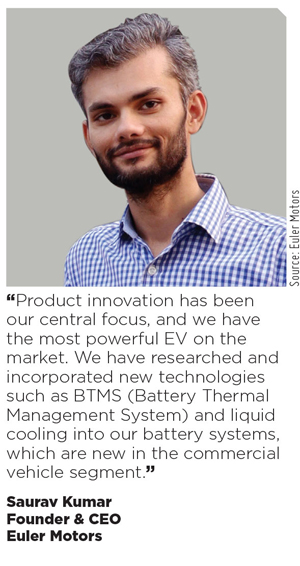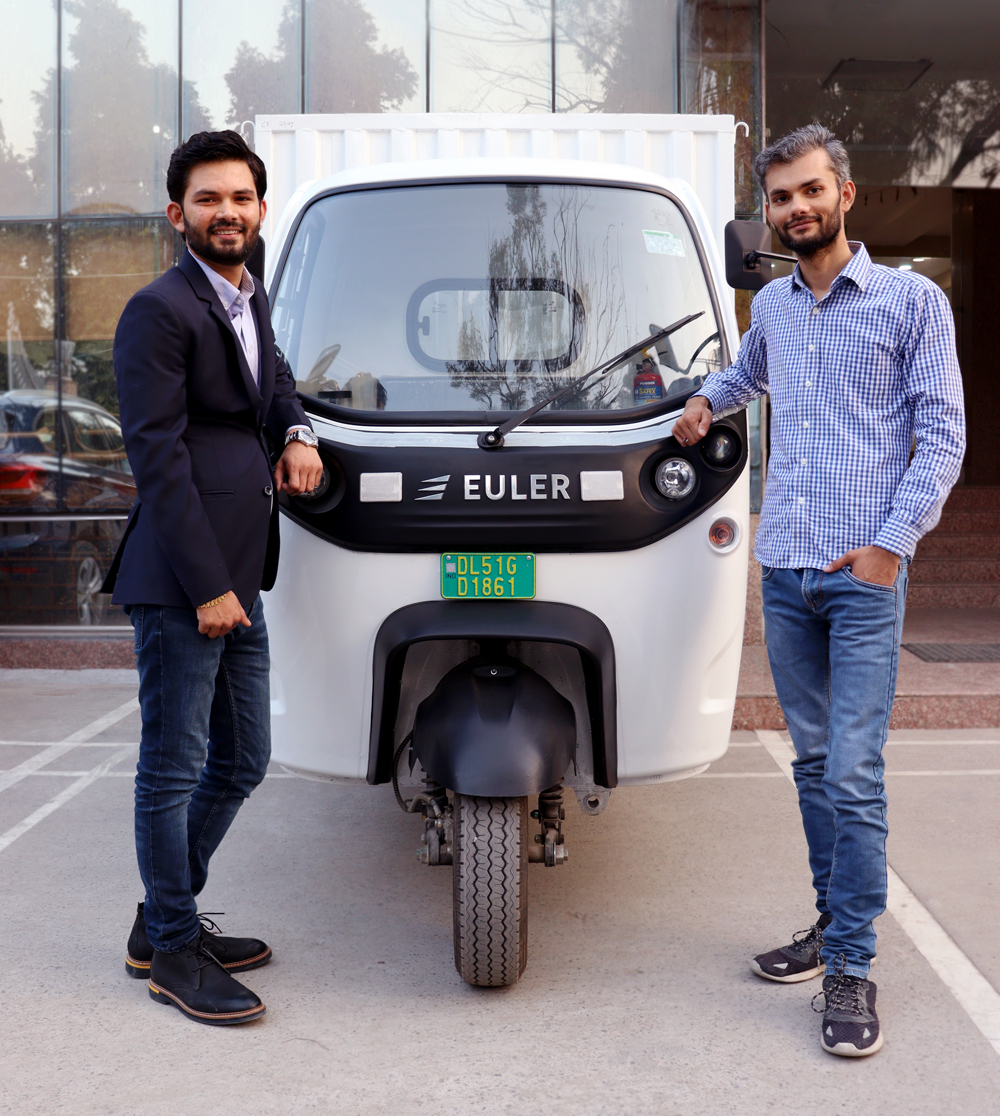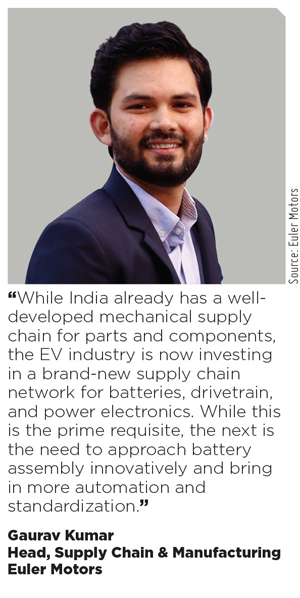LEADING THE EV REVOLUTION

Auto tech startup Euler Motors aims to create superior alternatives to traditional mobility while removing barriers to EV mass adoption in India. From humble beginnings to steadily expanding its customer base beyond the development stage, the company is ready to take the business to the next level.
Named after the scientist Leonard Euler, Euler Motors was founded with the urge to address the rising pollution concerns and build innovative and powerful electric vehicles and a mobility ecosystem for India. “We have been inspired by companies like Tesla, which have successfully brought EVs to the world map and are driven towards making Euler Motors a Tesla for CVs (commercial vehicles) in India,” shares Saurav Kumar, Founder & CEO, Euler Motors.
 “With our full-stack approach, which comprises powerful vehicles, charging infrastructure, service support and advanced technologies, we are making customers comfortable and open to EVs in the first- and last-mile segment, including intercity travel,” he adds, pointing it out as one of the company’s most unique value propositions that has inspired immense customer confidence in the industry.
“With our full-stack approach, which comprises powerful vehicles, charging infrastructure, service support and advanced technologies, we are making customers comfortable and open to EVs in the first- and last-mile segment, including intercity travel,” he adds, pointing it out as one of the company’s most unique value propositions that has inspired immense customer confidence in the industry.
Saurav is in charge of product development and business expansion. He has also been involved in the design and development of HiLoad and its battery pack, as well as customer engagement and liaising with investor groups to raise funds for the company’s expansion. Other founding members include Gaurav Kumar, Head of Supply Chain & Manufacturing and Vani Rikhy Mehra, AVP, Sales and Mobility.
Gaurav oversees the company's entire value chain and processes, from component procurement to inventory and vendor management to vehicle production and planning. Mehra leads the vehicle’s entire sales ecosystem and the company’s customer order book and institutional sales. In the last two years, she has led the company’s customer pilot program, where she has worked with major e-commerce and hyper-local delivery companies such as Flipkart, Big Basket, Udaan, and Ecom Express. She and her team have managed the entire vehicle deployment, maintenance, and service support, resulting in a strong customer order book for the company, which has already surpassed 3,500 units. She is also looking into retail sales, engaging with captive and retail customers.

The industry should now focus on avenues for indigenous production of cells for EVs. The spotlight is also on semiconductors, which form the prime component of EV batteries, and perhaps now is the right time to put in efforts to localize these in India.
Innovative mobility solutions
The company, founded in 2018, has focused on building on tech leadership and designing superior products suited for Indian customers and road conditions, shares Saurav. HiLoad, the company’s flagship vehicle, is a market differentiator with the highest payload capacity in the three-wheeler cargo segment, including Internal Combustion Engine (ICE) vehicles, at 688 kg. The payload capacity is also higher than the industry standard of 550 kg. “As an innovative EV, it also boasts of the highest battery power (12.4 kWh) and highest range (151 KM) with over six segment-first innovations in the segment to suit best-in-class performance,” he mentions.
The HiLoad battery pack has an integrated thermal management system and liquid cooling technology that allows vehicles to withstand a wide range of ambient temperatures and topographies for extended battery life. The vehicle also includes advanced telematics and software for fleet tracking, battery monitoring, and real-time charging, making it one of India’s most advanced and powerful electric vehicles. “We also have a footprint of over 500 charging infra points to support electric vehicles on the ground, with multiple charging variants and charge on wheels options,” he claims.
 Tackling hurdles
Tackling hurdles
Speaking of the teething issues and the strategies to deal with the increasingly fierce competition in the EV field, Saurav explains, “Our product, along with a full-stack approach towards EVs, has struck a chord with customers. Traditionally, EV models have been plagued by poor designs and fall short against bumpy stretches or extreme weather conditions. Therefore, product innovation has been our central focus, and we have the most powerful EV on the market. We have researched and incorporated new technologies such as BTMS (Battery Thermal Management System) and liquid cooling into our battery systems, which are new in the commercial vehicle segment.”
He shares that the main concerns for customers in this segment are load capacity, reliable performance, and range anxiety, and that HiLoad excels in all of these areas. “We are also a step ahead in the industry as HiLoad is equipped with advanced telematics and software assistance that assures effective fleet management and real-time charging updates, contributing to efficient performance,” he adds. “EVs cannot operate in silos, and we have, therefore, built products that are suitable for local business needs and provided charging infra and service support to ensure effortless operations. Our flexible and fast charging solutions, along with a network of charging stations and active service support, have also helped us gain customer trust.”
When asked about the lack of charging stations, charging time, and higher initial costs, which are some of the other barriers to EV adoption, Saurav responds by saying, “Yes, charging infrastructure is a critical factor towards EV adoption. Along with big and efficient battery packs, we have fast onboard chargers and an external charging network to address range anxiety in EVs. We have also introduced a unique initiative called ‘Charge on Wheels’ mobile service stations, which will provide charge and service to our EVs at any given location or breakdown point.” Another major issue in the industry is EV financing, which he addresses by announcing, “We have also partnered with leading financiers in the EV space to provide easy credit access for drivers of electric vehicles and provide them with flexible options to cover asset costs.”
Gaurav then helps us understand some stellar manufacturing practices and technologies essential for EVs, “EVs are driven by electricals and electronics. While India already has a well-developed mechanical supply chain for parts and components, the EV industry is now investing in a brand-new supply chain network for batteries, drivetrain, and power electronics. While this is the prime requisite, the next is the need to approach battery assembly innovatively and bring in more automation and standardization. This will help achieve a mass scale to produce vehicles that provide the same quality output across all deployments.”
He points out that another focus for EVs should be on sustainable manufacturing, “As responsible OEMs, we must commit to sustainability and aim to have a completely green value chain while adding multiple recycling processes on the shop floor. This should help set new benchmarks in auto manufacturing in India.”
HiLoad, the company’s flagship vehicle, is a market differentiator with the highest payload capacity in the three- wheeler cargo segment, including Internal Combustion Engine (ICE) vehicles, at 688 kg. The payload capacity is also higher than the industry standard of 550 kg.
Raising funds
Financing and competition are two of the most significant barriers that startups face. However, the company has received funding from industry heavyweights such as ADB Ventures, Blume Ventures, Inventus Capital India, QRG Investments and Holdings, and US-based Emergent Ventures, with a total of US$21.6 million raised since its inception. Revealing about the next round, Saurav says, “Euler Motors has commenced its series B fundraise and plans to raise around US$50 million this year. The company plans to utilize these funds to scale up and strengthen its production capacity to deliver the strong order lineup for its HiLoad EV and cater to strong demand from the retail segment. The funds will also be used to expand our market footprint in India.”
Three Wheels United (TWU), a Bengaluru-based tech-enabled financier of light EVs, has recently partnered with Euler Motors to accelerate the adoption of electric three-wheelers in India and promote sustainable mobility. “Our partnership with Three Wheels United is a strategic move to enable mass adoption of electric vehicles in India and achieve our common vision of zero-emission logistics and sustainable business operations. With this partnership, we aim to shift cargo drivers from renting to having their own three-wheeler EVs,” he shares.
TWU will address the issue of high financing costs for potential EV drivers by offering loans covering up to 100 percent of the asset cost. Euler Motors will deploy over 1,000 HiLoad EVs across Delhi NCR, Bengaluru, Chennai, and Hyderabad as part of its partnership by the end of the financial year 2023.
Three Wheels United (TWU), a Bengaluru-based tech-enabled financier of light EVs, has recently partnered with Euler Motors to accelerate the adoption of electric three-wheelers in India and promote sustainable mobility.
Localizing the EV supply chain
EVs with robust hardware and advanced software are the future, and while the primary supply chain for vehicle building exists, battery cell production in India has yet to be localized. Gaurav elaborates on the requirements, “The industry, thus, should now focus on avenues for indigenous production of cells for EVs. The spotlight is also on semiconductors, which form the prime component of EV batteries, and perhaps now is the right time to put in efforts to localize these in India.”
He believes that in the coming years, semiconductors will be critical not only for the EV transition but also for digital transformation in other industries.
“Therefore, as an industry, we must look at dedicating new capacity to enhance our tech sovereignty. The prevalent chip shortage is steering us into collaboration and bringing in new players to innovate in this field. At Euler Motors, we have been working with suppliers from day one from the R&D stage to localize our components and design EVs from India, for India,” he states.
Sharing his thoughts on the company’s strategies for localized EV manufacturing and value chain networks, Gaurav informs, “Our approach has been on design and IP control, and our strategy has been to develop our own products. We don’t retrofit. We have built our products from the ground up, with a localized component and supply chain, and partnerships. We have, therefore, incorporated in-house innovation on the technological front and deep partnerships with the right component manufacturers to create world-class EVs and chargers.”
He further continues, “We have approximately 500 components in vehicles, of which approximately 100 components are in battery systems. We procure these from the best suppliers without compromising on quality. We also have established channels where we can source components from multiple vendors if one channel doesn’t work. Further, we have already achieved 85 percent of localization in our EVs.”
The road ahead
The company’s first product HiLoad has received a positive response and has been in high demand across segments such as retail and e-commerce, as well as across markets throughout India. The CEO and Founder shares, “Currently, we have a production capacity of 4,000 units per annum, which we have planned to scale up by 35,000 units per annum by investing `200 crore in the next 12 months. We intend to have 8,500 units of HiLoad on the road by the end of the financial year 2023. We also have plans to set up an automated battery line for our patented liquid-cooled battery pack technology, which will set industry benchmarks in green manufacturing and sustainability.”

Sovan Tudu
Sub-Editor
Magic Wand Media Inc
Sovan.tudu@magicwandmedia.in
Source: Euler Motors




 Facebook
Facebook.png) Twitter
Twitter Linkedin
Linkedin Subscribe
Subscribe